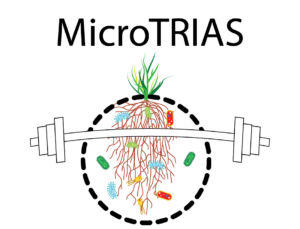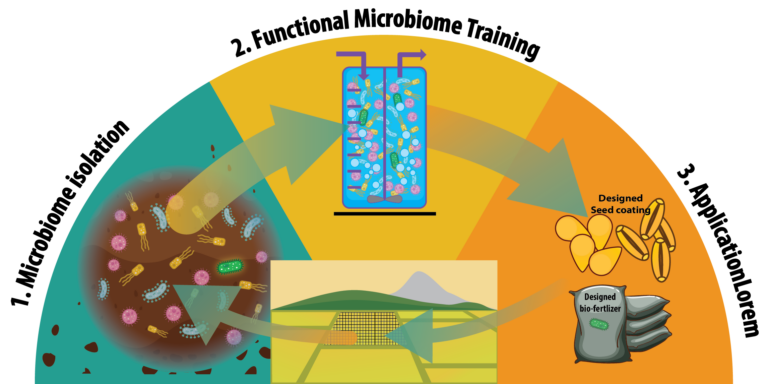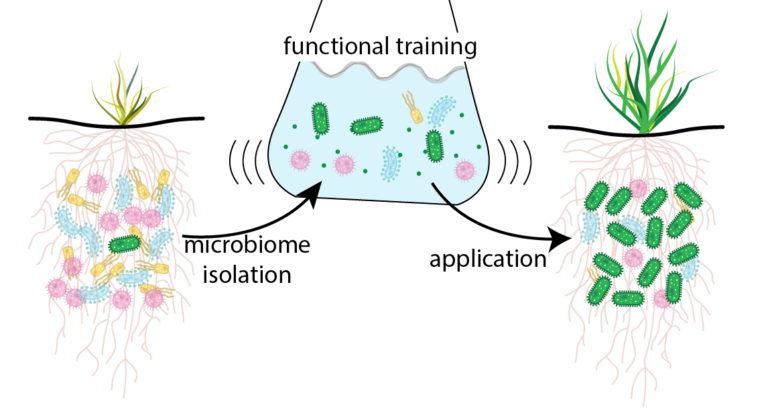Welcome to microTRIAS project
Microbiome training towards improving agricultural sustainability
Microbiome training towards improving agricultural sustainability

Microbes are essential for plants to grow in good health, and we already know it. What we also know is how some of the microbes help plants and how others don’t (diseases). In our project we want to get what’s the best for crops from the hidden pool of soil microbes. In principle, we will shape the complex communities of microbes on demand to magnify the beneficial potential of any soil.
The soil beneath our feet is not just a medium for growing plants; it’s a thriving ecosystem of microorganisms that play a crucial role in nutrient cycling, plant health, and overall ecosystem stability. We believe that the key to a more sustainable and resilient agricultural future lies beneath our feet: in the rich and complex world of soil microbiomes.
The soil beneath our feet is not just a medium for growing plants; it’s a thriving ecosystem of microorganisms that play a crucial role in nutrient cycling, plant health, and overall ecosystem stability. We believe that the key to a more sustainable and resilient agricultural future lies beneath our feet: in the rich and complex world of soil microbiomes.
The microTRIAS project will suppose the first proof of concept of this novel approach, opening new avenues for plant-associated microbes applications in agricultural settings.

1.Capturing the living part of the field soil
2. Magnifying the potential of soil microbiomes introducing a functional shift
3. In the future perspective, applying beneficial microbiomes back to the field
Why Soil Microbiome training?
By nurturing and understanding these tiny but mighty allies, we can:
By nurturing and understanding these tiny but mighty allies, we can:
- Boost Crop and Soil Health by promoting nutrient uptake and reducing chemical inputs.
- Improve Yield by improving resilience to environmental stresses like drought and salinity or diseases.
- Use the soil resources efficiently by promoting biotransformation of micro- and macro-elements, or nutrients to the forms that plants can assimilate.
- Reduce Environmental costs by minimizing soil erosion, reducing water pollution, and sequestering carbon, mitigating the impact of climate change.

The Benefits of Sustainable Agriculture
Embracing sustainable agriculture not only benefits our environment but also leads to healthier, more resilient farming communities. By developing solutions for sustainable agriculture our project contributes to:
Embracing sustainable agriculture not only benefits our environment but also leads to healthier, more resilient farming communities. By developing solutions for sustainable agriculture our project contributes to:
- Environmental Conservation: Reduced chemical usage and improved soil health protect ecosystems, wildlife, and water resources.
- Economic Viability: Sustainable agriculture can lead to higher crop yields, cost savings, and increased market access.
- Community Well-being: Stronger, more diverse local food systems create jobs and enhance food security.
About Us
The research is conducted The Institute for Mediterranean and Subtropical Horticulture (IHSM) in Málaga. The institute is a place for innovative research in the area of plant science, environmental microbiology, crop protection and management. The microTRIAS project is a part of CarrionLab, research group full of people committed to exploring the secrets of microbes for the benefit of the planet and humanity.
Get Involved
We invite you to be part of this transformative journey toward sustainable agriculture. If you are a student interested in research internship or want to know more about the project, contact us.
If you want to know more
check for updates on this website or follow our twitter
twitter:@Adam_Oss

Funded by the European Union under the Marie Sklodowska-Curie grant agreement No.101106349. Views and opinions expressed are however those of the author(s) only and do not necessarily reflect those of the European Union or the European Commission (granting authority). Neither the European Union nor the granting authority can be held responsible for them.
